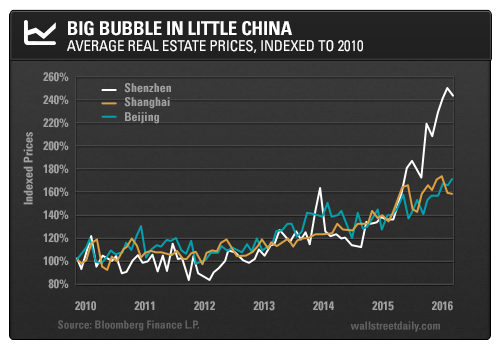The casino and gaming industry in Macau—China’s gambling mecca—dwarfs that of Las Vegas, Nevada.
Macau, however, isn’t the speculation capital of China, despite its love of betting. That honor belongs to another city…
Shenzhen is located just north of Hong Kong and has a population of over 10 million people.
The city is a major manufacturing center, home to the second-tallest building in all of China, and boasts one of the highest-volume container ports in the world.
In June 2015, I examined how the Shenzhen Stock Exchange (LON:SSE) was in the latter stages of a historic stock market mania. The Shenzhen equity bubble was, by some measures, even more egregious than the U.S. technology stock bubble back in 2000.
Valuations have retreated somewhat, although the market cap weighted average price-to-earnings ratio on the SSE is still around 95 times. In other words, valuations are only obscene now – rather than ludicrous as they were in mid-2015.
But, if a bursting stock market bubble wasn’t enough to contend with, now Shenzhen has an even bigger problem.
Top-Tier Mania
In China’s major cities, the real estate markets are on fire.
Charted below are the average sales price increases for Shanghai, Beijing, and Shenzhen real estate since the beginning of 2010:

China bulls would argue that rising real estate prices are healthy because they reflect a mass migration from the rural areas into cities, facilitated by job opportunities and increased incomes.
However, this narrative is highly suspect.
As you can see in the chart, real estate prices were basically unchanged from the beginning of 2010 until the end of 2013. Keep in mind that Chinese economic growth subsequently slowed.
Then, in early 2015, real estate prices started to skyrocket in tandem with the Chinese stock markets.
In less than 18 months, prices in Shenzhen have risen by over 75%. This rapid ascent is a speculative mania rather than simply a supply-demand imbalance.
There are even reports of lenders helping buyers circumvent minimum down-payment requirements. After all, it wouldn’t be a proper housing bubble without buyers putting zero money down, would it?
Interestingly, the spectacular price gains are largely limited to China’s top cities. Prices elsewhere have languished due to a glut of supply.
At the end of 2015, the equivalent of 719 million square meters of housing inventory remained unsold in China, the vast majority of which stood in third- and fourth-tier cities. At 30 square meters of living space per capita, that’s enough to house around 24 million people.
Why live in a cheaper, less-populous city, when you could live in a larger metropolis and benefit from relentless home price increases, right? You could even flip apartments in your spare time to supplement your income. This is the collective mindset in ebullient housing markets.
Bubble Machine
Despite surplus inventory, the over-construction continues outside the major cities because the country is attempting to achieve the government’s gross domestic product (GDP) targets. And the credit expansion fueling this over-building increases the money supply.
Since China’s capital account isn’t open, the money sloshing around from the credit expansion can’t easily escape. So hot money inflates domestic financial assets (such as stocks) as well as real assets (like housing in big cities).
Shenzhen just happens to be the bubble capital of a bubble economy.
Furthermore, the timing of China’s upper-tier real estate mania is unfortunate due to some stiff demographic headwinds.
According to the United Nations’ Population Division, China’s total population of 20 to 39 year olds has already peaked, and is projected to decline by 10% over the next decade. With this age cohort on the decline, the pool of potential first-time homebuyers is shrinking.
Between bursting equity bubbles, nascent property bubbles, housing gluts, and poor demographics, China’s central planners will continue to have their hands full.
It’s no wonder that the People’s Bank of China has cut benchmark lending rates and lowered banks’ reserve requirement ratios numerous times in the past couple of years. Obviously, the easing will need to continue.
Luckily for us, there’s a silver lining to all of this: China’s woes are bullish for U.S. Treasuries.
Safe (and high-yield) investing.
